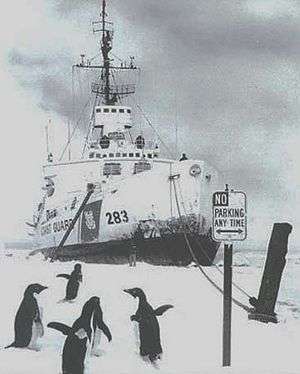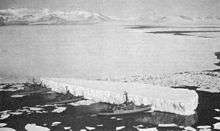USCGC Burton Island (WAGB-283)
 | |
| History | |
|---|---|
| Name: | USS Burton Island (AG-88) |
| Namesake: | An island off the coast of Delaware |
| Builder: | Western Pipe and Steel Company (WPS), San Pedro, California |
| Cost: | US$9.880,037.00 |
| Laid down: | 15 March 1946 |
| Launched: | 30 April 1946 |
| Christened: | 1946 |
| Completed: | 1946 |
| Commissioned: | 28 December 1946 |
| Decommissioned: | 15 December 1966 |
| Maiden voyage: | 17 January 1947 |
| In service: | 8 December 1946 |
| Out of service: | 15 December 1966 |
| Struck: | 1966 |
| Identification: |
|
| Nickname(s): | B.I. |
| Fate: | Transferred to U.S. Coast Guard |
| Name: | USCGC Burton Island (WAGB-283) |
| Recommissioned: | 15 December 1966 |
| Decommissioned: | 9 May 1978 |
| Homeport: |
|
| Identification: | Call sign: NEVK |
| Nickname(s): |
|
| Fate: | Sold for scrap, 17 August 1980 |
| General characteristics | |
| Class and type: | Wind-class icebreaker |
| Displacement: | 6,515 tons (1945) |
| Length: | 269 ft (82 m) |
| Beam: | 63 ft 6 in (19.35 m) |
| Draft: | 25 ft 9 in (7.85 m) |
| Installed power: | 6 × Fairbanks-Morse 8-1/8OP 10-cylinder opposed-piston engines (6 × 2,000 hp) |
| Propulsion: |
|
| Speed: | 13.4 knots (24.8 km/h; 15.4 mph) |
| Range: | 32,485 mi (52,280 km) |
| Endurance: |
|
| Boats & landing craft carried: | 4 lifeboats. 1 LCVP. 1 Greenland Cruiser, later Arctic Survey Boat (ASB) |
| Sensors and processing systems: |
|
| Armament: |
|
| Aircraft carried: | 2 single rotor helicopters and air detachment personnel |
| Aviation facilities: | Flight deck and retractable hangar with aircraft service capabilities |
USS Burton Island (AG-88) was a United States Navy Wind-class icebreaker that was later re-commissioned in the United States Coast Guard as the USCGC Burton Island (WAGB-283). She was named after an island near the coast of Delaware.
Construction
Burton Island was one of the icebreakers designed by Lt Cdr Edward Thiele and Gibbs & Cox of New York, who modeled them after plans for European icebreakers he obtained before the start of World War II. She was the sixth of seven completed ships of the Wind-class of icebreakers operated by the United States Coast Guard. Her keel was laid on 15 March 1946 at Western Pipe and Steel Company shipyards in San Pedro, California, she was launched on 30 April 1946, and commissioned on 28 December 1946 with Commander Gerald L. Ketchum in command.[1][2][3]
Her hull was of unprecedented strength and structural integrity, with a relatively short length in proportion to the great power developed, a cut away forefoot, rounded bottom, and fore, aft and side heeling tanks. Diesel electric machinery was chosen for its controllability and resistance to damage.[4] Burton Island was built during peacetime, so she had a much lighter armament than her war-built sisters, one 5 in (130 mm) 38 cal. deck gun and three quad-mounted Bofors 40 mm anti-aircraft autocannons when in Navy service, and unarmed for the Coast Guard.[3][5]
Ship's history
U.S. Navy, 1947–1966
On 17 January 1947, Burton Island, loaded with supplies, steamed from San Diego to the Ross Sea, Antarctica where she met with units of TF 68 on the first Antarctica Development project, Operation Highjump. After returning from Antarctica, Burton Island departed 25 July 1947 for the Point Barrow expedition to Alaska.
From April 1948 to December 1956, Burton Island participated in 19 Arctic and Alaskan cruises, including Operation Windmill. During Operation Windmill in the Antarctic Burton Island was the flagship of CDR Gerald L. Ketchum, USN commander of Task Force 39. Duties on the cruises varied including, supply activities, helicopter reconnaissance of ice flows, scientific surveys, underwater demolition surveys, and convoy exercises.
In March 1949, Burton Island was redesignated AGB-1.
One prominent excursion was with the submarines USS Seadragon (SSN-584) and USS Skate (SSN-578) in 1962, in which torpedoes were tested underneath the polar ice pack after the two submarines had rendezvoused at the North Pole.[6]

US Coast Guard, 1966–1978
On 15 December 1966, the U.S. Navy transferred the vessel, along with all of its icebreakers, to the United States Coast Guard and it was renumbered WAGB-283. After its transfer, Burton Island was stationed at Long Beach, California and used for icebreaking operations. Starting in 1967 through 1978, Burton Island went on eight different Deep Freeze operations to the Antarctic. In the operations, Burton Island was responsible for creating and maintaining aids to navigation, clearing channels through the ice for supply vessels, laying cables, delivering and dispatching the U.S. Mail at remote stations and vessels, search and rescue, fisheries patrol, law enforcement, and giving dental and medical treatment at remote Native Alaskan communities. In addition to Deep Freeze operations, Burton Island served as a floating platform for scientific surveys and research around Alaska and other isolated polar areas. Burton Island also conducted numerous search and rescue (SAR) missions.
From October 1967 to April 1968 she participated in Operation Deep Freeze '68. From October 1968 to April 1969 she participated in Operation Deep Freeze '69. From November 1969 to April 1970 she participated in Operation Deep Freeze '70 and her accompanying icebreaker USCGC Edisto (WAGB-284) was disabled. From November 1970 to April 1971 she participated in Operation Deep Freeze '71 and again her accompanying icebreaker USCGC Staten Island (WAGB-278) was disabled. From August to September 1971 she conducted an oceanographic survey along North Slope, Alaska. From February to March 1972 she conducted a scientific survey in Cook Inlet, Alaska. From November 1972 to April 1973 she participated in Operation Deep Freeze '73. From June to July 1973 she conducted oceanographic research in Alaskan waters. From November 1974 to April 1975 she participated in Operation Deep Freeze '75. From 13 November 1975 to 26 February 1976 she participated in Operation Deep Freeze '76. From July to September 1976 she deployed to the Arctic. From 9 November 1976 to 7 April 1977 she participated in Operation Deep Freeze '77. During that deployment in December, 1976, she carried out numerous search-and-rescue missions at Wellington, New Zealand, following a torrential downpour. From 9 July 1977 to 8 September 1977 she undertook a cruise to the Arctic Ocean, during which time her crew constructed several radar navigation towers along the north coast of Alaska and conducted gravity surveys of the Arctic Ocean. From 20 November 1977 to 1 April 1978 she participated in Operation Deep Freeze '78. From mid-1977 to 9 May 1978 she was stationed at Government Island/Coast Guard Island Alameda, California and used for icebreaking.
Decommissioning and sale
She was decommissioned on 9 May 1978. An excerpt from a Maritime Administration letter dated 21 November 1995 indicates her ultimate fate:
- The Maritime Administration sold the vessel by auction under PD-X-1033 dtd. 17 August 1980. The vessel was awarded to Levin Metals Corporation, San Jose, California[7] on 7 October 1980, under contract No. MA-9868 for $261,000.00 The "Burton Island" was scrapped as of 28 April 1982.
Notes
- ↑ "USCG Burton Island". U.S. Coast Guard Cutter History. United States Coast Guard. Retrieved 12 December 2012.
- ↑ "USN Burton Island". Dictionary of American Naval Fighting Ships. United States Navy. Retrieved 12 December 2012.
- ↑ "USCG Icebreakers". U.S. Coast Guard Cutter History. United States Coast Guard. Retrieved 12 December 2012.
- ↑ "Burton Island 1966". U.S. Coast Guard Cutter History. United States Coast Guard. Retrieved 12 December 2012.
- ↑ Tales of a Cold War Submariner by Dan Summitt, 2004.
- ↑ Levin Metals Corporation, 1800 Monterey Highway, San Jose, California 95112
A 1/300 scale plastic model kit of the Burton Island is available by Revell-monogram or on eBay.
References
This article incorporates text from the public domain Dictionary of American Naval Fighting Ships. The entry can be found here.